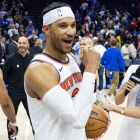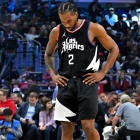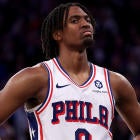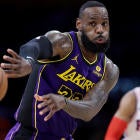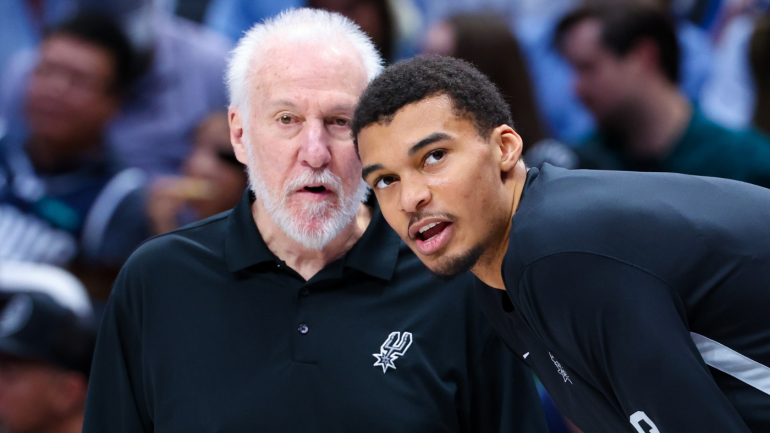
The names came one after the other in a dizzying rush, a breaking-news version of all-time-great dominoes. Pete Carroll. Nick Saban. Bill Belichick.
The Seattle Seahawks' coach had been pushed aside. The New England Patriots' coach, perhaps the greatest in NFL history, was parting ways with the team he'd led to six championships. The Alabama head coach, certainly the greatest in college football history, was retiring.
It was enough to wait for the next shoe to drop, the next name to fall, the next all-time great septuagenarian who'd defined a team and an era to suddenly say goodbye. Here in the NBA, it was hard not to look south to San Antonio and, in that gold rush of sudden goodbyes, let the mind wander to head coach Gregg Popovich and just how long he'll be a Spur.
He fits all the parameters. All-time great? Check. Perhaps the best to ever do it? Check. An exorbitant number of titles to compare to Saban's seven and Belichick's six? Check? At an age — 74, older than his three football contemporaries — where change might be afoot? Check, check, check.
But rest assured Spurs fans. There are several things that separate Pop's reality from that of the Sabans and the Belichicks and the Carrolls of the world, and that which makes his situation wholly different.
First, and perhaps most important, is the very-real fact that Popovich's greatness remains firmly intact — as does the recognition of that reality within his organization. That, clearly, was no longer true for the Patriots and Seahawks brass when they gazed at their own legendary coaches.
Some of this is because Popovich's excellence isn't just a Spurs story. His time as the head coach of the U.S. Men's National Team exposed a range of players — and all-time greats themselves — to his excellence. Street cred matters, even for head coaches like Popovich.
Over his San Antonio tenure, or at least through its many championships, Pop was also a partner with Tim Duncan and Duncan's all-time greatness, not a mere beneficiary of it. The same can no longer be said with surety about Belichick without Tom Brady.
That Brady left New England and immediately won a Super Bowl with Tampa Bay, while the Patriots began a descent to where they are now, strips even the most legendary coaches of their cache, luster and, eventually, if things go poorly enough, their jobs.
Pop's history is different. Duncan never left to win elsewhere, and Kawhi Leonard's exit, though leading to its own quick championship in Toronto, quickly gave way to injuries and a sense of what could have been. And while Kawhi was great, he never raised the question like Brady did about where the true brilliance emanates from in their respective teams.
And, unlike Saban, who is 71, Pop, even at 74, clearly wants to keep going. He's said it. He seems to still love it. Some coaches like to spend their golden years on the golf course. Some, like Pop, seem to prefer staying in the arena that's defined their careers.
But the most important difference between Pop and the two football legends who did not get to leave on their own terms is the fact that he's blessed with the possibility of another Duncan — or LeBron, or Jordan, or Brady, or however you want to characterize the GOAT-like potential of Victor Wembanyama.
Carroll is gone in large part because Russell Wilson stopped being Russell Wilson, and then was shipped off to Denver. Belichick is certainly gone — which is to say, he lost in a way he never did before — because Brady was literally gone. And neither Geno Smith in Seattle nor Mac Jones in New England (or Cam Newton, or Bailey Zappe, or anyone else) could fill that talent gap.
But the Spurs' situation, and therefore Pop's position within it, is very, very different. Wemby is the real deal, a lottery ticket of greatness that both offers protection from the idea a change might be needed and the kind of hope and excitement and challenge and responsibility that might make an old (basket)ball coach stick around for a while.
And maybe that's the biggest difference of them all.
San Antonio's bad season doesn't matter, because, unlike in Seattle and New England, there's a sense of hope. Forget this year's standings, you can gaze into the future and see a shimmering vision of what-can-be. And in it is Popovich winning again.
Wembanyama's talent, and the uniqueness of his potential, must be catnip to a coach like Pop as he contemplates the possibilities. There is a duty in shepherding that kind of talent to true success, just as there was when Pop helped Duncan go from a promised one to an actual, all-time, top-10 great.
And there's a promise of what can be — of what Wemby plus Pop can equal — that would make any organization patient with and committed to their all-time great coach.
Belichick lost Brady, and then he lost games, and then he lost his place in New England. Carroll, too, found out that there are short memories, even for legends when the playoff drought turns too parched.
But nothing whets the appetite, nor motivates the ambitious, nor protects someone like Pop, like a Wemby-level talent.
So rest easy, Pop fans. The last few days have shown us you never know when greats will suddenly, shockingly go.
But Gregg Popovich isn't going to be one of them until, like Saban, he chooses so himself.


















